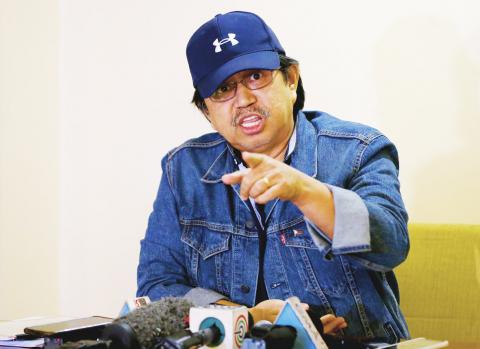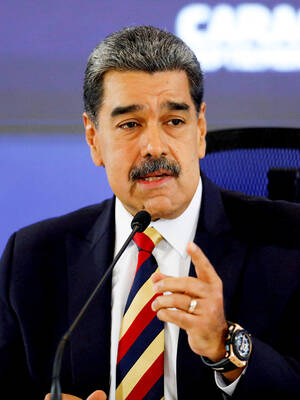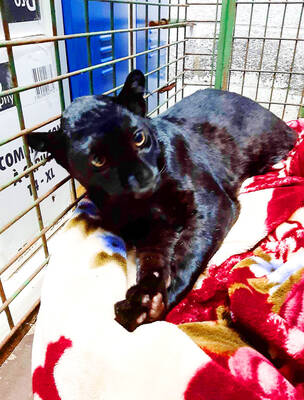Philippine President Rodrigo Duterte on Tuesday accused a dismissed police colonel, who had publicly criticized him and his deadly anti-drug campaign, of criminal involvement and said he wanted to know why the former officer “is still alive.”
In a late-night televised speech, Duterte condemned dismissed police senior superintendent Eduardo Acierto, who told reporters on Sunday that the president had been repeatedly photographed with two Chinese men involved in drug trafficking.
Duterte defended one of the two Chinese men, saying that he had accompanied China’s premier on a visit to the Philippines and was a businessman who traveled to the country in 1999 to sell Chinese-made cellphones.

Photo: AP
Acierto, an anti-narcotics officer before his dismissal by an anti-graft agency last year, said that he submitted a report to top police officials and Duterte’s office about the two Chinese to warn the president of their background, but was never informed if the two were investigated.
“In my investigation, I discovered that our president ... is often accompanied by two people deeply involved in illegal drugs,” Acierto told a news conference in Manila late on Sunday, adding that in a later criminal complaint, authorities accused him, instead of the Chinese men, of involvement in drug smuggling.
Acierto was the only police official who has made the allegations against the two men, Duterte said.
Acierto was an “idiot” allegedly involved in corruption, drug smuggling, kidnappings of Chinese nationals and the killing of a South Korean man, Duterte added.
“Don’t ever believe specially this Acierto,” Duterte said in a speech in the city of Koronadal. “What if I ask the military and the police: ‘Why is this son of a bitch still alive?’”
Acierto has denied doing wrong.
Duterte mentioned Acierto while talking about his efforts to combat corruption, including corrupt policemen, and also criticized and ridiculed opposition senatorial candidates running in May mid-term elections.
Philippine Drug Enforcement Agency Director General Aaron Aquino on Monday said that he received Acierto’s report and sent it to Duterte’s office, adding that both his office and that of the president took steps to validate the allegations against the two Chinese.
The two were not on any list of drug suspects, he added.
Aquino played down the photographs showing Duterte with the two Chinese men, saying that officials often get approached by all sorts of people for group photographs, without being able to rapidly check their background.
Profiles of the two Chinese provided by Acierto to reporters said that they were involved in the “manufacturing, financing, the importation, transhipment and local distribution of meth or shabu,” referring to the local name for methamphetamine.
Acierto said that he initially welcomed Duterte’s passion to combat illegal drugs, but added that he later realized that the president’s deadly crackdown targeted mostly poor drug suspects instead of going after powerful drug lords and traffickers.
More than 5,000 drug suspects have been killed in what police say were gun battles that ensued during drug raids under Duterte’s crackdown, alarming Western governments and human rights groups.

VENEZUELAN ACTION: Marco Rubio said that previous US interdiction efforts have not stemmed the flow of illicit drugs into the US and that ‘blowing them up’ would US President Donald Trump on Wednesday justified a lethal military strike that his administration said was carried out a day earlier against a Venezuelan gang as a necessary effort by the US to send a message to Latin American cartels. Asked why the military did not instead interdict the vessel and capture those on board, Trump said that the operation would cause drug smugglers to think twice about trying to move drugs into the US. “There was massive amounts of drugs coming into our country to kill a lot of people and everybody fully understands that,” Trump said while hosting Polish President

China on Monday announced its first ever sanctions against an individual Japanese lawmaker, targeting China-born Hei Seki for “spreading fallacies” on issues such as Taiwan, Hong Kong and disputed islands, prompting a protest from Tokyo. Beijing has an ongoing spat with Tokyo over islands in the East China Sea claimed by both countries, and considers foreign criticism on sensitive political topics to be acts of interference. Seki, a naturalised Japanese citizen, “spread false information, colluded with Japanese anti-China forces, and wantonly attacked and smeared China”, foreign ministry spokesman Lin Jian told reporters on Monday. “For his own selfish interests, (Seki)

Japan yesterday heralded the coming-of-age of Japanese Prince Hisahito with an elaborate ceremony at the Imperial Palace, where a succession crisis is brewing. The nephew of Japanese Emperor Naruhito, Hisahito received a black silk-and-lacquer crown at the ceremony, which marks the beginning of his royal adult life. “Thank you very much for bestowing the crown today at the coming-of-age ceremony,” Hisahito said. “I will fulfill my duties, being aware of my responsibilities as an adult member of the imperial family.” Although the emperor has a daughter — Princess Aiko — the 23-year-old has been sidelined by the royal family’s male-only

A French couple kept Louise, a playful black panther, in an apartment in northern France, triggering panic when she was spotted roaming nearby rooftops. The pair were were handed suspended jail sentences on Thursday for illegally keeping a wild animal, despite protesting that they saw Louise as their baby. The ruling follows a September 2019 incident when the months-old feline was seen roaming a rooftop in Armentieres after slipping out of the couple’s window. Authorities captured the panther by sedating her with anesthetic darts after she entered a home. No injuries were reported during the animal’s time on the loose. The court in the